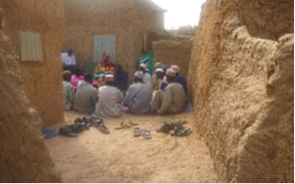Alia Inno wanders through the courtyard of the integrated health centre (IHC) of Dan Barto, a village located 70km south of Zinder, near the border between Niger and Nigeria. Wearing a Phrygian headdress and with her hands dyed with henna, this 30-year-old woman presents a striking example to her community.
She carries on her back a boy born barely six months ago, the third child she has given birth to at home under the supervision of a traditional matron. He will be the last, she says. Today, she has a post-natal appointment with a midwife at the Integrated Health Centre (IHC) – and her husband, Abdoulhabi Sani, whom she married at the age of seventeen, is accompanying her.
“My wife suffered too much during her deliveries, particularly the second one, when she spent many hours in labour. It was difficult for me to bear, and I feared for her life and that of the baby. I addressed the issue by deciding that she should henceforth go to the health centre on a regular basis, and I went with her,” he says.
This was a change for Abdoulhabi Sani in attitude and behaviour towards health services, and it has a catalyst. Mr. Sani has become one of the most diligent members of the ‘husbands’ school’ in Dan Barto, a village that falls in the region covered by the Department of Matameye.
“It is at this school that I learned of all the benefits of assisted delivery. Before, my wife was convinced that the health centre had no safety guarantee,” he says. After being sensitized by her husband on the benefits and advantages of assisted delivery, and with his agreement, she changed her mind. “Today, my wife is convinced about the merits of going to health centres,” he says.
Alia Inno vowed never to repeat the ordeal she experienced during her second delivery, which left her with a trauma that she has difficulty narrating: “My second child is not growing normally and I do not want to experience these hardships any more. I want to organize my conjugal life and also avoid giving birth in a disorderly manner that leads to complications. As a result, my husband and I agree and everything is done based on his reliable advice.” This new approach to birth is an illustration of the success of the activities carried out by husbands’ schools.
The strategy was implemented in 2008 in six districts of Zinder Region (Tanout, Mirriah, Goure, Matameye, Magaria, and the Urban Commune of Zinder). To date, the region has 131 operational schools with 1572 members. The objective of this initiative is to look for appropriate ways that will help involve men in the promotion of reproductive health and, therefore, bring about a positive change of behaviour among husbands, who are the key actors who can save women from pregnancy- and birth-related complications, promote family planning and sensitize them on the benefits of reproductive health.
With a population of 16 million, Niger has a population growth rate of 3.3 per cent – one of the highest in the world – and a total fertility rate of 7.1 children per woman. The maternal mortality rate is 554 per 100,000 live births, according to the national survey on maternal and infant mortality (INS, 2010). This means that every two hours, a woman dies from complications related to pregnancy or childbirth in the country.
To address this issue, the Niger government implemented a policy aimed at improving reproductive health, with the support of technical and financial partners. It is against this backdrop that the United Nations Fund for Population Activities (UNFPA) developed and implemented the strategy of husbands’ schools, with financial support from the European Union and the Spanish Cooperation.

The strategy was based on the results of a study commissioned by UNFPA to get a better understanding of obstacles to the promotion of reproductive health services in Zinder region. A number of barriers to the use of reproductive health services were identified, the most important being the attitude and behaviour of men, who determine whether or not women can access health centres.
The husbands’ school initiative is in line with the Action Plan of the International Conference on Population and Development (ICPD-PA), which is based on involving men in promoting maternal health. The initiative began with a regional workshop involving husbands from the Zinder region as well as traditional rulers, health agents and UNFPA. The husbands defined the criteria for becoming a member of the schools, including that one must be at least 25 years old, be of good moral character, allow his wife to go to health centres, and be involved in community services.
“The husbands’ school has no classroom, no student, no teacher and no hierarchy,” Yacine Diallo, UNFPA Representative for Niger (from 2008-2011) said at the time of its inception. “It is a forum for reflection and decision making for model husbands who want to make other husbands change their behaviour."
The school aims to facilitate women’s access to care, counselling services and professional assistance in the area of health and to ensure that women and children use health centres.
Karima Mallan Tsahirou, the wife of a member of one of the schools, had this to say: “Since my husband became a member of the husbands’ school, I witnessed that things have changed. He comes to sensitize me about going for prenatal consultation. Afterwards, it is my husband himself who accompanies me to the health centre for all consultations. Thanks to his guidance and support, I am now using family planning, because I used to have pregnancies close together. I am proud of the actions of the husbands’ school.”



